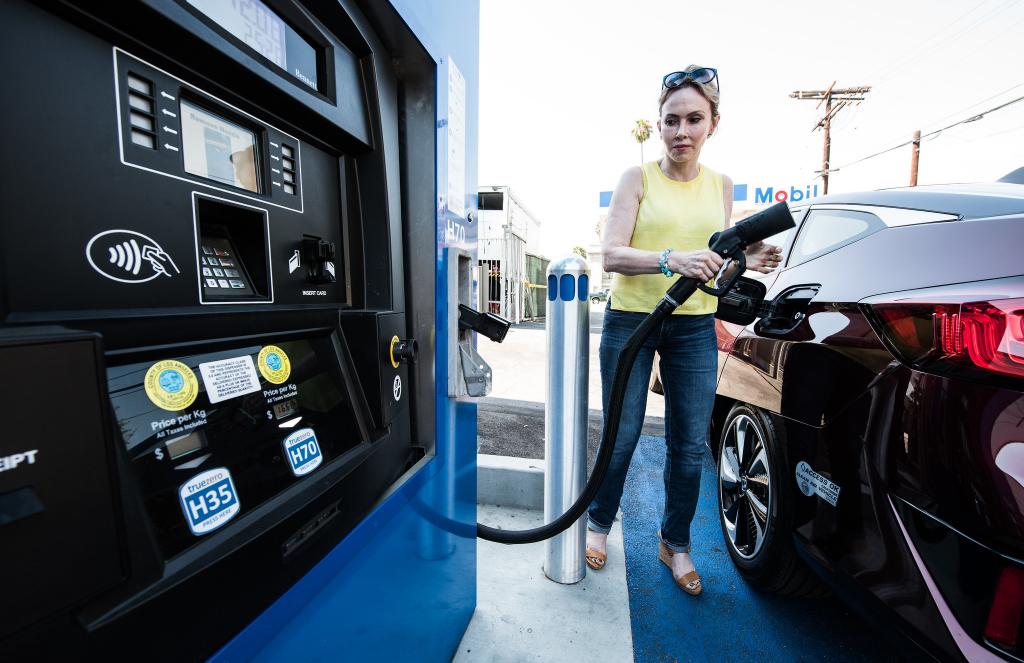Thessaloniki gets ready for its metro launch in November
The underground rapid transit lines have been under construction for almost two decades due to various project delays
 TheMayor.EU logo
TheMayor.EU logo 
Hydrogen charging station, Source: H2 fueling stations by Dennis Schroeder/ NREL, on Flickr (CC BY-NC-ND 2.0)
The Government sees this as the key to achieving climate neutrality in the country
Yesterday, 6 October, the Spanish Council of Ministers approved a document called “Hydrogen Roadmap: a commitment to renewable hydrogen”. The vision described in it is that of a green economy centred around the sustainable production of hydrogen, as a clean fuel source. If carried out correctly this would result in having a fully renewable electricity system in the Iberian country by 2050 as well as the generation of multiple sustainable jobs for its population.
The roadmap document details national objectives, which are in tune with the European Hydrogen Strategy for 2030. If achieved, by that time the country should be able to cut down 4.6 million tons of greenhouse gas emissions and 25% of its hydrogen consumption should be renewable.
Unlike sunlight and wind, hydrogen is not a primary source of energy but is rather considered an energy vector. It is not found anywhere on Earth in pure form, either, so the only ways of extracting it are man-made. One of these ways, known as steam methane reforming (SMR) is industrial, the other one is through electrolysis of water which breaks it into its components – hydrogen and oxygen.
The first of these methods releases CO2 into the atmosphere, whereas the second one if using electricity from renewable source can be considered sustainable – hence the green hydrogen designation.
The hydrogen produced is considered valuable because it is capable of storing energy that can be produced and released at a later stage – think of hydrogen batteries, for example. By 2030, it is expected to have at least 150 hydrogen buses, 5000 vehicles, and 2 train lines operating on the territory of the country. The 5 major ports and airports will have hydrogen charging stations.
The ambition of the Government is to install hydrogen production facilities with a total capacity of 4 gigawatts, which will represent 10% of the total production in Europe, turning renewable energy production into the main focus of the Spanish economy of the future.

The underground rapid transit lines have been under construction for almost two decades due to various project delays

Now you can get your wine in Talence by paying directly in Bitcoin

That’s because the state has to spend money on updating the railway infrastructure rather than subsidizing the cost of the popular pass

Rethinking renewable energy sources for the urban landscape

The examples, compiled by Beyond Fossil Fuels, can inform and inspire communities and entrepreneurs that still feel trepidation at the prospect of energy transition

Now you can get your wine in Talence by paying directly in Bitcoin

The 10th European Conference on Sustainable Cities and Towns (ESCT) sets the stage for stronger cooperation between the EU, national and local level to fast track Europe's transition to climate neutrality.

At least, that’s the promise made by the mayor of Paris, Anne Hidalgo

The underground rapid transit lines have been under construction for almost two decades due to various project delays

At least, that’s the promise made by the mayor of Paris, Anne Hidalgo

Hostal de Pinós is located in the geographical centre of the autonomous region

Despite its church-y name, the district has long been known as the hangout spot for the artsy crowds

Urban dwellers across the EU are having a say in making their surroundings friendlier to people and the environment.

Forests in the EU can help green the European construction industry and bolster a continent-wide push for architectural improvements.

Apply by 10 November and do your part for the transformation of European public spaces

An interview with the Mayor of a Polish city that seeks to reinvent itself

An interview with the newly elected ICLEI President and Mayor of Malmö

A conversation with the Mayor of Lisbon about the spirit and dimensions of innovation present in the Portuguese capital














